As the state finance minister seeks government support to ease the pressure of GST on theatre groups, the city's experimental stage fraternity holds on
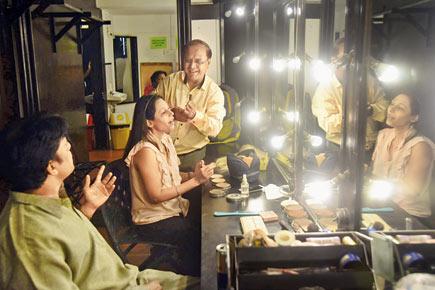
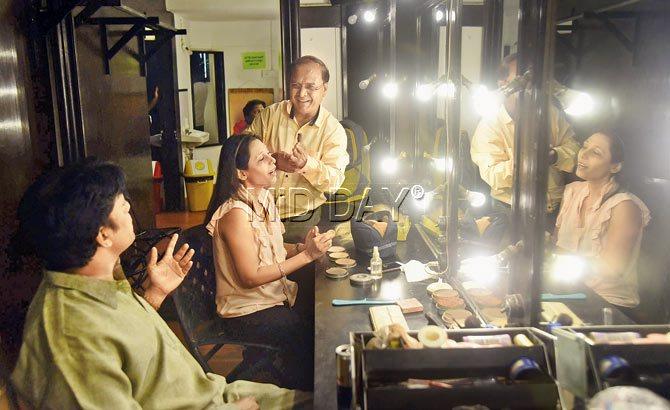
While big-ticket productions like Ank Theatre's Jis Lahore Nahin Dekhya (cast seen here in the make-up room) continue to draw crowds despite GST and higher prices, it's the experimental groups that are the worst hit. Prithvi's manager Lalit Sathe says performances by indie groups make up almost 60 per cent of Prithvi's programming calendar. Pic/Sameer Markande
ADVERTISEMENT
Yesterday, 31 ministers, including finance and deputy chief ministers from across India, arrived in Hyderabad for a day-long Goods and Services Tax (GST) Council meeting, chaired by Union Finance Minister Arun Jaitley. The 21st meeting since the inception of the uniform taxation, and the third since its rollout on July 1, was held to take stock of its implementation, and address hiccups.
Maharashtra finance minister Sudhir Mungantiwar had hoped to request the council to review the hefty 18 per cent GST on tickets to theatrical performances priced higher than Rs 250. "Theatre should be accessible to the middle class. We wish to push for an increase in the ticket price limit to Rs 500. I'm certain the government will agree. However, time didn't permit us to bring up the issue. I'm hoping to take it up at next month's review," he told mid-day.
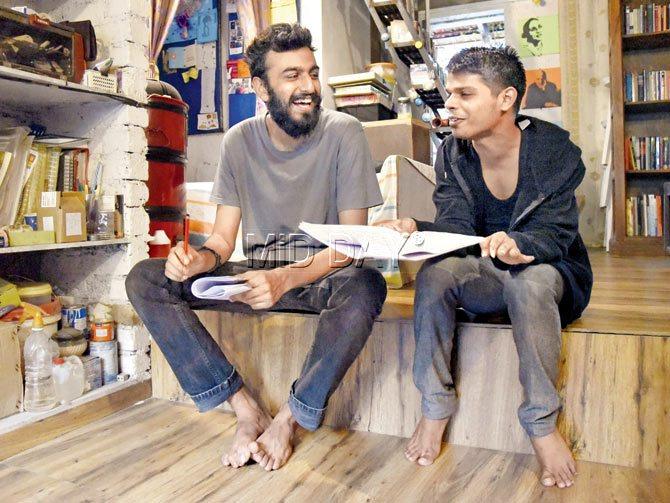
Harsh Shah and Omkar Bhatkar rehearse for their new play, Fly On..., that opens next month. Omkar says he will price the tickets at Rs 250. Pic/Pradeep Dhivar
The push comes at the behest of a 15-member delegation of Mumbai's theatrewallahs, including eminent Gujarati producers Bharat Thakkar and Kaustubh Trivedi and well-known Marathi actor-director Ashok Hande, who met Mungantiwar and state cultural minister Vinod Tawde at Mantralaya on June 27, to discuss their apprehension.
Prasad Kambli, producer and president of theatre artistes' body, Marathi Natya Nirmata Sangh Mumbai, was part of the delegation. He explains that although a 15 per cent service tax was earlier levied by the centre, it only applied to tickets priced above Rs 500. "We didn't face the burden we do now because most of our tickets are priced between Rs 300 and Rs 350. In the last two months, 90 per cent of Marathi theatre producers have slashed their rates to Rs 250, bearing a Rs 50-rupee loss per ticket. Close to one lakh people in Maharashtra depend on theatre for their livelihood. The industry will survive only if the GST revision comes into place," he says.
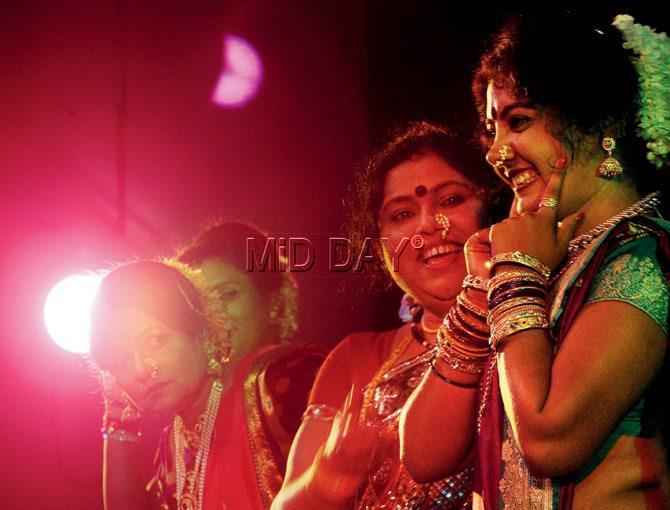
Bhushan Korgaonkar of Kali Billi Productions (Below) says he cannot afford to lower ticket rates in the hope of skirting GST because the lavani dancers who arrive in Mumbai from across Maharashtra for the Sangeet Bari performances have to be provided both, travel expenses and stay
Count the stubs
Lalit Sathe, manager at Juhu's Prithvi Theatre, ratifies Kambli's claim.
Right after the GST rollout, most Hindi and English language theatre groups performing at Prithvi slashed their admission rates fearing audience rejection. Darshak Utsav, a six-day stage fest held in July by Makarand Deshpande's Ansh, lowered its weekday show prices from Rs 300 to Rs 250. A quick calculation of what that means for the 200-seater venue reveals a difference of Rs 10,000.
Sathe suggests that the prominent theatre groups might be able to tide over the challenge. Ank's critically acclaimed production, Jis Lahore Nahin Dekhya, staged last Sunday at Prithvi, despite selling tickets at R535, witnessed over 80 per cent occupancy.
The first-week shows of Naseeruddin Shah's ambitious production, The Father, which is set to enjoy a month-long run at NCPA's Experimental Theatre, have also been doing well despite a Rs 590 ticket. Writer-director Omkar Bhatkar says it's because theatre enjoys a loyal audience. "Unlike a film, which comes to TV or online, a play can only be experienced live."
But, it's the indie productions that have had to make a compromise. Prateik Babbar-Jackky Bhagnani starrer Riddles, staged at Jeff Goldberg Studio in Khar, and O! Frida, a solo act on the Mexican artiste held at The Drama School Mumbai (DSM), which operates out of Girgaon's Mumbai Marathi Sahitya Sangh premises, capped their prices at Rs 250. "The big groups form only 40 per cent of Prithvi's programming calendar. It will be difficult for the rest, especially experimental groups," says Sathe.
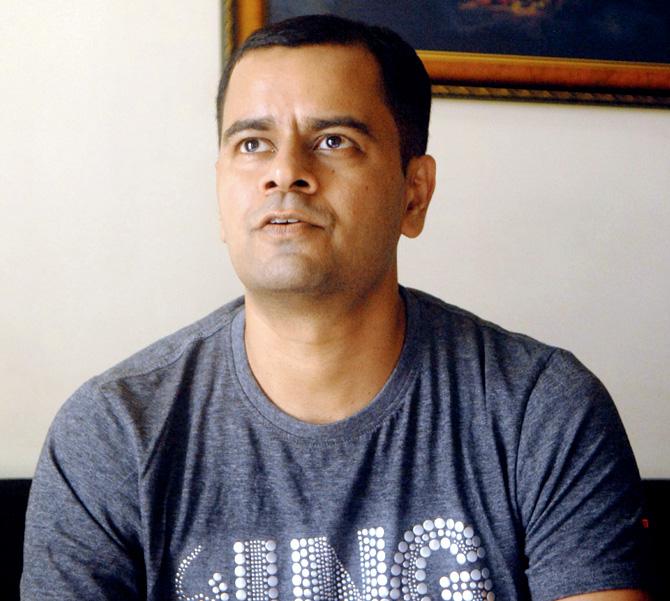
One theatre, one tax
Veteran writer-director Sunil Shanbag cannot understand why unlike food, theatre has been subjected to a uniform GST slab. "In the food sector, products for daily consumption are taxed lower than luxury eats, so why not follow the same rule for theatre?" asks Shanbag, who priced tickets for both his productions, Words Have Been Uttered and Stories In A Song, R300+ GST. "The idea for a R250 ticket was not viable at all," he says. Made on a shoestring budget, Words Have Been Uttered is a 75-minute piece, themed on dissent, to be staged today at Studio Tamaasha in Andheri.
On the other hand, Stories In A Song, which premiered in 2012, is a magnum opus with music conceptualised by Shubha Mudgal and Aneesh Pradhan. A fortnight ago, it was staged in Mumbai for two shows only. "I could have hiked the price to Rs 400 but with an additional 18 per cent tax, the ticket price would have shot up drastically," he says. Even on a Rs 300 ticket, Shanbag says a patron ends up shelling out Rs 80 to Rs 100 more now since online booking portals, also subject to GST, have to be paid handling fees. "Almost 70 per cent of ticket sales happen via portals. So, experimental theatre, which always walks the tightrope of economics, is facing the heat."
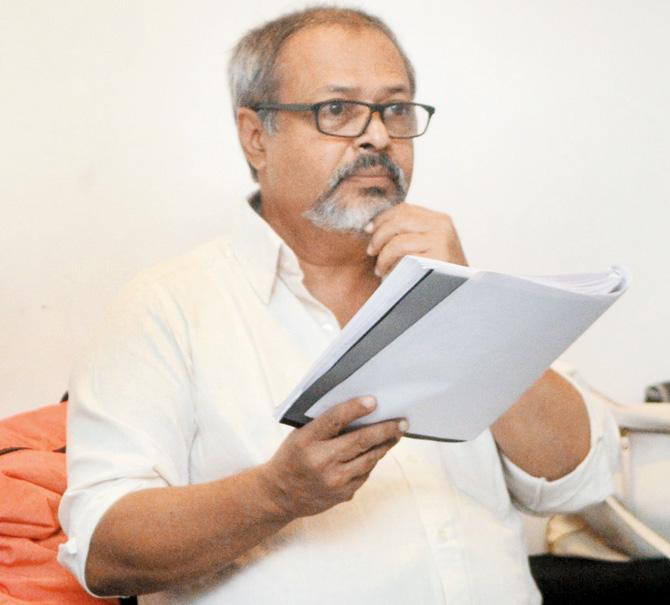
Sunil Shanbag
Stuck in the GST web
Pricing tickets over Rs 250 leads to headaches beyond drop in footfall. It means a producer has to register for a GST number, file monthly returns, and hire a chartered accountant for Rs 10,000/month. Bhushan Korgaonkar, writer-producer at Kali Billi Productions, is behind Sangeet Bari, the popular indie production that sees lavani performers from across Maharashtra take centre stage before metropolitan audiences. With tickets priced at Rs 415, he staged two shows at Prithvi on August 19. The evening show was packed but the other witnessed only 50 per cent occupancy. "But we can't reduce prices because we need to incur travel expenses."
Gerish Khemani, director of Ripples, a play that has seen a steady run since 2015, wishes to take the production to Delhi by the year-end, but a Rs 250 ticket won't even cover his travel cost. He says, "I'm still trying to figure a rate that assures an audience without burdening them."
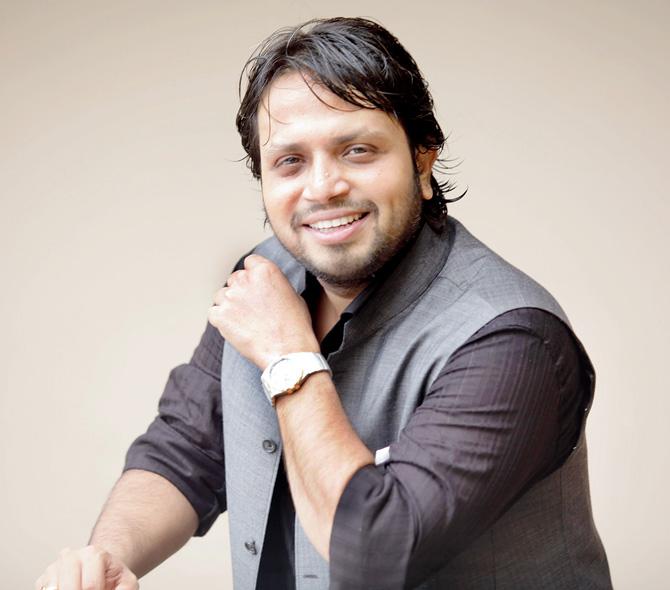
Prasad Kambli
Post-GST, Bhatkar estimates an overall 30 per cent increase in production costs, whether it's renting a venue, sourcing costumes or opting for print advertisements. "Since most of the sector is unorganised, we have been unable to get the input credit [amount paid as tax while acquiring resources] we have to bear. Actors whose fees go beyond Rs 1.5 lakh also charge GST. Theatre was never a profit-making venture. We are still trying to figure our budgets to understand the full implication of GST," says Ragini Khushwaha, programme head, DSM, echoing the sentiment of the experimental theatre fraternity.
 Subscribe today by clicking the link and stay updated with the latest news!" Click here!
Subscribe today by clicking the link and stay updated with the latest news!" Click here!






